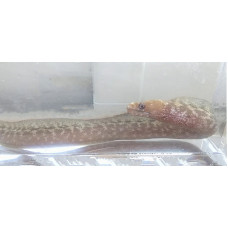Latin name
Gymnothorax chilospilus
Other name
Textile moray, white-lipped moray, white-lipped reef eel.
Identification
The species was first named by Pieter Bleeker in 1864. Lipspot morays have 121-133 vertebrae.
Features of fish fins
Dorsal spines (total): 0; Dorsal soft rays (total): 0; Anal spines: 0; Anal soft rays: 0; Vertebrae: 121 - 133.
Fish colouring
This fish is named for the distinctive white spot on the lower lip near the corner of the mouth. The body is light brown with a dendritic pattern. There is a dark brown spot at the corner of the mouth, preceded by a large white spot on the lower lip (often followed by another above and behind the corner of the mouth); the pores on the upper and lower jaws are usually covered with conspicuous white spots.
Distribution
Widespread in the Indo-Pacific: from South Africa and Oman to Hawaii and the Society Islands, north to the Ryukyu and Ogasawara Islands, south to northern Australia and the Loyalty Islands.
Habitat
Tropical marine benthic species inhabiting coral reefs. Depth range from 0 to 45 meters.
Size
The maximum length of this species is 50.5 cm.
Behavior
Swims mainly on shallow coastal reef shoals, usually less than 5 meters (16 feet) deep, but can also be found on deep-water rocky reefs.
Food and feeding habits
Predators that feed on various species of fish, crustaceans, and octopuses.
Reproduction
Females lay eggs that are immediately abandoned. Males then swim to the clutch site. They fertilize the eggs; a clutch may be fertilized by several males. The larvae hatch from the eggs after about two weeks and are carried by the current along with plankton.
Fishing
Have a minor commercial interest in the fishery.
Relationship with a person
Harmless.
| Classification | |
| Phylum | Chordata |
| Class | Actinopterygii |
| Squad | Anguilliformes |
| Family | Muraenidae |
| Genus | Gymnothorax |
| Species | G. chilospilus |
| Features | |
| Conservation status | Least Concern |
| Habitat | Bottom |
| Life span, years | No information |
| Maximum body weight, kg | No information |
| Maximum length, cm | 50,5 |
| Sailing speed, m/s | No information |
| Threat to people | Not edible |
| Way of eating | Predator |
Lipspot moray eel
Tags: lipspot moray eel

